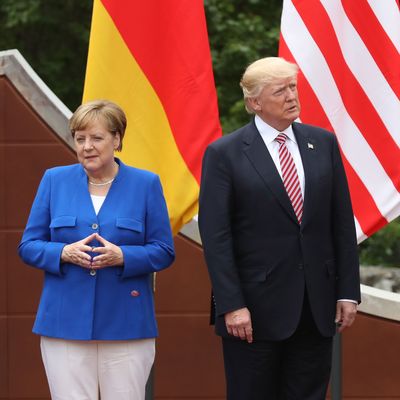
Donald Trump began his first foreign trip as president with a visit to a totalitarian, Islamist state that stones adulterers, beheads dissidents, exports fundamentalist Islam throughout the Middle East, and, according to Trump circa 2016, orchestrated the 9/11 attacks.
But the president was far too diplomatic to broach these petty offenses during his time in Riyadh. “We are not here to lecture,” Trump informed the Saudi royal family, in a speech that touted the “splendor” of his hosts’ “magnificent kingdom,” and reiterated America’s commitment to defend the Saudis’ interests against Iranian treachery.
The president ended his trip with a visit to the G7 summit, the annual meeting of major industrial democracies — nations that share an economic system, worldview, and long history of mutually beneficial cooperation with the United States.
One such nation, Germany, sells a lot of cars to American consumers. And while many of those cars are manufactured in the American South, not all of them are. Further, Germany has not been diverting quite as much revenue into NATO’s coffers as America would like.
In Trump’s view, these offenses were far too egregious to be papered over with diplomatic niceties.
In a closed-door meeting with European leaders last Thursday, Trump called Germany “bad, very bad” for running a trade surplus with the United States. “Look at the millions of cars that they’re selling in the USA. Horrible. We’re gonna stop that,” Trump reportedly added.
His top economic adviser, Gary Cohn, proceeded to display either an audacious contempt — or baffling ignorance — of the European Union’s most basic principles, by raising the prospect of the U.S. reaching a bilateral trade agreement with Germany (the EU only negotiates trade deals as a group).
On the campaign trail, Trump trafficked in dire warnings about an inevitable clash of civilizations between fundamentalist Islam and the West. As president, he has treated the world’s leading exporter of fundamentalist Islam with more respect than he’s shown the leaders of Western Europe.
This contradiction is stark, but not terribly difficult to explain. Saudi Arabia did everything in its power to flatter Trump’s ego, gifting him a gold medal, a $110 billion arms deal, and orb access. The leaders of Western European democracies, beholden as they are to the views of electorates that overwhelmingly despise Trump, could pay the president no such tribute. In fact, French president Emmanuel Macron actually went out of his way to communicate his bemused contempt for the reality-star-in-chief.
Now, domestic political concerns on both sides of the Atlantic appear to be widening the rift between Washington and Berlin. On Sunday, German chancellor Angela Merkel told supporters that her nation could no longer rely on the U.S. or the U.K., saying, “we Europeans truly have to take our fate into our own hands … This is what I experienced in the last few days.”
Merkel’s chief rival for reelection this September, Social Democrat Martin Schulz, rallied to the chancellor’s defense (and to the opportunity to play to his countrymen’s anti-Trump sentiments).
“The chancellor represents all of us at summits like these, and I reject with outrage the way this man takes it upon himself to treat the head of our country’s government,” Shulz said, referring to our president. “That is unacceptable.”
In a February poll, 78 percent of Germans said they were “very concerned by Trump’s policies,” nearly 20 percent more than were worried about Putin’s.
On Tuesday morning, Trump gave those respondents more cause for concern.
It’s worth noting that German trade surpluses are a genuine problem — one that is “very bad” for southern Europe. If Trump were criticizing Merkel’s government on the grounds that its domination of European trade and monetary policy was a form of soft imperialism that’s causing economic stagnation in some EU nations — and full-blown social crises in others — then his attack would be more than defensible.
But Trump’s tweet wasn’t inspired by a long night of reading columns by Yanis Varoufakis. The president is merely seeking to perpetuate the (baseless) idea that the American economy is plagued by his predecessors’ bad deals with Western Europe, which will soon be renegotiated by the master deal-maker.
On Tuesday in Australia, John McCain expressed his dismay with Trump’s approach to diplomacy.
“I realize that some of President Trump’s actions and statements have unsettled America’s friends,” the senator told a crowd at at the University of Sydney. “They have unsettled many Americans as well.”






























